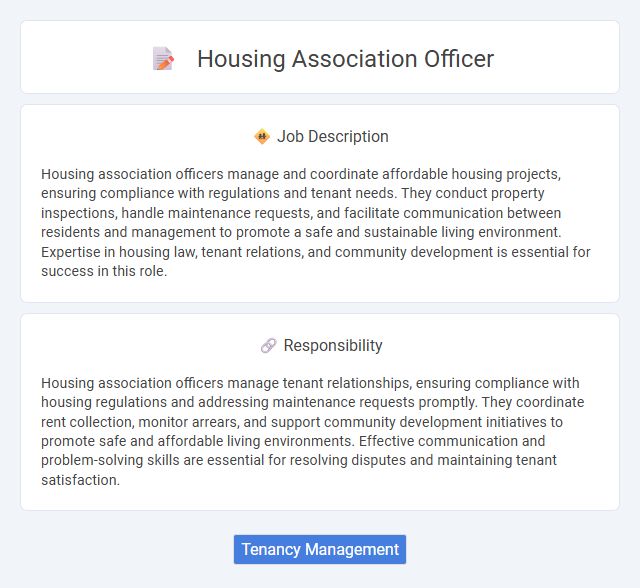
Housing association officers manage and coordinate affordable housing projects, ensuring compliance with regulations and tenant needs. They conduct property inspections, handle maintenance requests, and facilitate communication between residents and management to promote a safe and sustainable living environment. Expertise in housing law, tenant relations, and community development is essential for success in this role.
Individuals with strong communication skills and empathy are likely to be suitable for a housing association officer role, as the job often involves supporting vulnerable tenants and resolving housing issues. Those who can manage stress well and demonstrate problem-solving abilities may have a higher probability of success in navigating complex housing regulations and tenant disputes. Candidates lacking patience or the ability to handle challenging social situations might find this role less fitting for their strengths.
Qualification
A Housing Association Officer typically requires a degree in housing, social sciences, or a related field, alongside relevant experience in property management or community development. Professional qualifications such as the Certificate in Housing or membership in the Chartered Institute of Housing (CIH) enhance career prospects and demonstrate sector-specific expertise. Strong knowledge of housing legislation, tenancy agreements, and welfare policies is essential for effectively supporting tenants and managing housing services.
Responsibility
Housing association officers manage tenant relationships, ensuring compliance with housing regulations and addressing maintenance requests promptly. They coordinate rent collection, monitor arrears, and support community development initiatives to promote safe and affordable living environments. Effective communication and problem-solving skills are essential for resolving disputes and maintaining tenant satisfaction.
Benefit
Housing association officer roles likely offer substantial benefits including access to affordable housing options and community support programs. Employees might also receive competitive salaries, pension schemes, and professional development opportunities. The position could provide job stability due to consistent demand within the social housing sector.
Challenge
Managing the diverse needs of residents while ensuring compliance with housing regulations may present significant challenges for a Housing Association Officer. Balancing limited resources against increasing demand for housing services could require strong problem-solving skills and adaptability. There is likely a constant need to mediate conflicts and address urgent maintenance issues, which may test an officer's resilience and communication abilities.
Career Advancement
Housing association officer roles offer significant opportunities for career advancement through specialized training programs and gaining expertise in property management, tenant relations, and regulatory compliance. Progression can lead to senior management positions such as housing manager or regional director, where strategic planning and leadership skills are essential. Continuous professional development and certifications in housing law and social care enhance prospects for higher responsibility and salary growth.
Key Terms
Tenancy Management
A Housing Association Officer specializing in Tenancy Management oversees tenant relations, lease agreements, and rent arrears to ensure compliance with housing policies. They coordinate repairs, handle tenancy disputes, and support residents with housing needs, promoting community stability and wellbeing. Strong knowledge of housing legislation, excellent communication, and conflict resolution skills are essential for effective tenancy management in housing associations.
 kuljobs.com
kuljobs.com